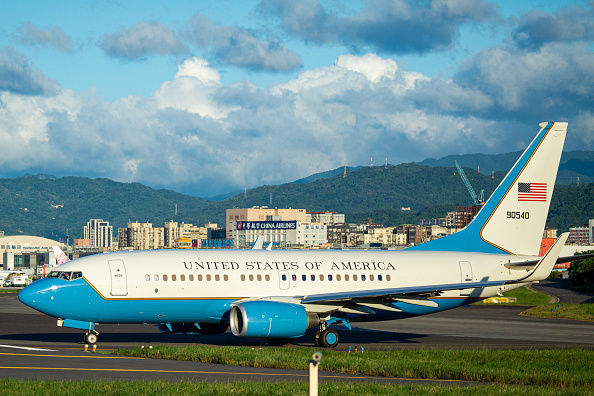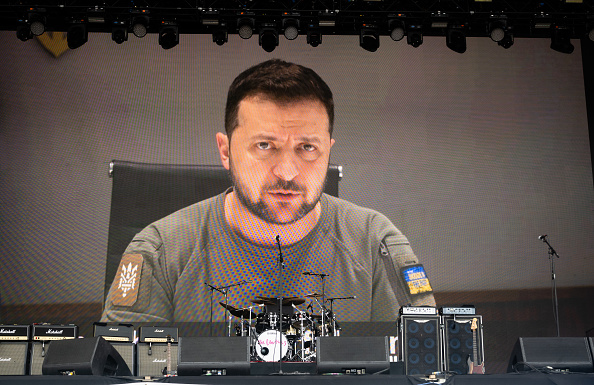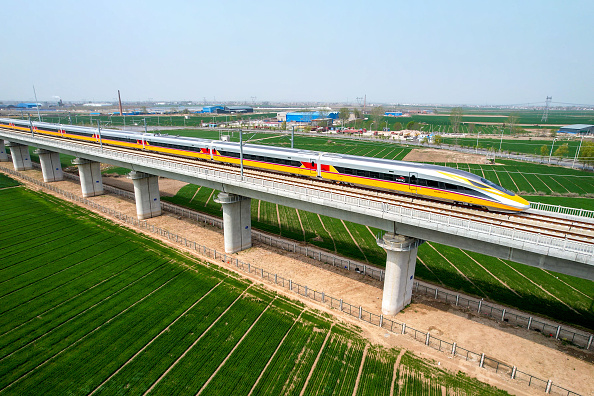
 Cross-Strait Outrage
Cross-Strait OutrageThis week, the U.S. House of Representatives Speaker Nancy Pelosi became the first speaker in twenty-five years to visit Taiwan, raising the ire of Beijing as President Tsai Ing-wen called the House speaker "Taiwan's most devoted friend." Amid a series of high-profile meetings that set the stage for heightened tensions with Beijing, Pelosi said her visit was intended to make it "unequivocally clear" that the United States would "not abandon" the democratically governed island.
After weeks of silence ahead of the visit and multiple warnings over how the visit could harm U.S.-China relations, Pelosi offered support for Taiwan as Beijing threatened incursions into the island's territory and fired multiple missiles toward waters near northeastern and southwestern Taiwan.
Following the visit, China's Ministry of Defense began drills in both the seas and airspace surrounding Taiwan. Taiwan's Ministry of National Defense said an unprecedented 27 Chinese warplanes made incursions into Taiwan's air defense identification zone, and 22 planes crossed the median line dividing the Taiwan Strait on Wednesday.
The White House has subsequently summoned China's ambassador to condemn China's "irresponsible" military activities near Taiwan as tensions continue to escalate in the region.
For its part, China has further retaliated by halting its relations with the U.S. on a range of issues, including talks on climate change and military ties. The pause in climate talks between the U.S. and China is symbolically significant for the two nations' bilateral relationship because the climate crisis was one of the few areas both countries had continued to cooperate on in recent years, even during times of heightened geopolitical tensions.
Learn more in "The Impact of the Taiwan Visit," a video with international economist and Senior Colonel (Ret.) Zhou Bo.
 Gaining Access
Gaining AccessPresident Volodymyr Zelensky of Ukraine has tried to speak directly to his Chinese counterpart, Xi Jinping of China, to urge a change in its position on Russia and to use Beijing's political and economic clout to help bring an end to the ongoing war in Ukraine.
In an exclusive interview, Zelenskyy told the South China Morning Post that he has been asking for a conversation with the Chinese president since the Russian invasion of Ukraine began in February, but that one is yet to take place.
Since the start of the war, Xi has maintained a close relationship with President Putin of Russia and refused to condemn the conflict. Despite claiming that Beijing respects Ukraine's right to sovereignty, it voted against a United Nations court order in March for Moscow to immediately suspend its military operations, refused to join a U.S.-led sanctions campaign to isolate Putin's regime, and has perpetuated the narrative that Washington is to blame for the conflict for encouraging the eastward expansion of the North Atlantic Treaty Organization.
Nancy Pelosi's visit to Taiwan has only drawn the Kremlin closer to Beijing, with Russia signaling that it "confirms the principle of 'one China' and opposes the independence of the island in any form."
"Everything about this tour and the possible visit to Taiwan is purely provocative," said Kremlin spokesperson Dmitry Peskov, before Pelosi arrived.
 A Slow Decline
A Slow DeclineA new report found that China's finance and investment spending in Belt and Road countries fell by around one billion dollars in the first half of this year, with no financing on any new coal projects or investments in Russia, Sri Lanka, or Egypt. That drop is contributing to the continued slowdown of money being spent on the project. Meanwhile, Saudi Arabia was the biggest recipient of Chinese investments over the last six months.
Since China launched the Belt and Road Initiative in 2013, the project has also come under criticism for funding polluting activities overseas. But that is slowly changing with President Xi's recent pledge to stop supporting foreign coal projects in efforts to reach carbon neutrality by 2030. The lack of investment could hobble future coal development, with more than 70% of coal plants built relying on Chinese funding.
On top of environmental degradation, the BRI has also come under scrutiny over the last few years for the debt burden it places on countries. Some countries have even renegotiated their investment projects with China, highlighting the debt risks.
"China is growing more concerned about it not being able to get paid back, so we have seen a pullback in lending that is set to accelerate," said Alicia Garcia-Herrero, the chief economist for Asia-Pacific at the investment bank Natixis.
But amidst debt risks and restructuring in targeted countries, Chinese media has emphasized that "the Belt and Road cooperation is marching to a higher quality and sustainable development."
Prepared by China-US Focus editorial teams in Hong Kong and New York, this weekly newsletter offers you snap shots of latest trends and developments emerging from China every week, while adding a dose of historical perspective.
- 2022-07-29 Playing with Fire
- 2022-07-22 Nixonian Flexibility
- 2022-07-15 List Diplomacy
- 2022-07-08 Easing Tariffs, Not Tensions
- 2022-07-01 Getting Tough
- 2022-06-24 Tools in the Box
- 2022-06-17 Unprecedented Oversight
- 2022-06-10 Squaring Off
- 2022-06-03 Diplomatic Chills
- 2022-05-27 Competing Visions
- 2022-05-20 Common Ground
- 2022-05-13 Bilateral Interests
- 2022-05-06 Vying for Mutual Benefit
- 2022-04-29 Seeking Relief
- 2022-04-22 Tipping Point
- 2022-04-15 “Persistence is Victory”
- 2022-04-08 No Divorce
- 2022-04-01 Auditing Accountability
- 2022-03-25 Playing Policy
- 2022-03-18 One Hand Cannot Clap